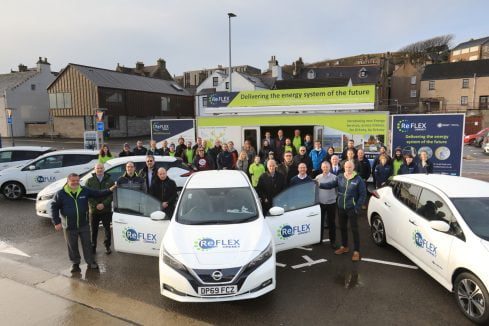The ground-breaking ReFLEX Orkney project has passed the first stage gate review, enabling it to move from feasibility stage to demonstration.
ReFLEX Orkney has successfully progressed through the first stage of the project, following a review meeting with UK Research and Innovation (UKRI) last month [January 2020].
Funded by UKRI through the Industrial Strategy Challenge Fund, ReFLEX Orkney is aiming to integrate electricity, transport and heat networks in Orkney using advanced software to balance demand and supply.
Moving into phase two, 2020 will see the launch of an attractive local electricity tariff tailored to the needs of ReFLEX’s innovative integrated energy system.
Work is now underway to set up a new local energy company to offer advice to local consumers and businesses on their energy needs, as well as providing affordable leasing options for new domestic and commercial batteries, electric vehicles and charging points in Orkney, with reduced upfront cost for end users.
This pioneering project will help Orkney maximise the potential of its renewable production capabilities and reduce the county’s carbon footprint by decreasing reliance on imported carbon-intensive grid electricity from the UK mainland.
Led by the European Marine Energy Centre (EMEC), the consortium includes locally-based partners Aquatera, Solo Energy, Community Energy Scotland, Heriot-Watt University and Orkney Islands Council, as well as multi-national energy company Doosan Babcock.
Rob Saunders, Challenge Director, Prospering from the Energy Revolution, UK Research and Innovation said:
“ReFLEX Orkney is a key component of the PFER Challenge and is showcasing how intelligent local energy systems of the future can bring about real benefits for users. It is therefore testament to the hard work and innovation amongst the ReFLEX team that they have successfully passed this first stage review. Clean energy, delivered across smart and efficient local networks will play a major role in achieving the net zero goals of 2050. The successful progress of demonstration projects like ReFLEX highlight the opportunities that are available to the UK through this kind of innovation. We look forward to working with ReFLEX on the next stage of their project.”
On behalf of the ReFLEX Orkney project partners, Gareth Davies, Aquatera Managing Director, said:
“Over the last nine months, the ReFLEX project partners have been hard at work assessing the feasibility of the project, developing the service offerings, and working out how best to deliver a progressive energy system within an out of date regulatory framework.
“The consumer services under development will be rolled out later in 2020 and are expected to include attractive and more affordable electricity tariffs, access to a wide range of EVs and other decarbonised energy technologies. It is also planned to deliver a range of rental or leasing options to try and make the adoption of such energy solutions as easy and affordable as possible for everyone.
“ReFLEX Orkney is a world first and recognises the key role Orkney has played in UK energy over the last half a century from oil and gas through to wave and tidal energy. Once demonstrated and proven in Orkney, it is expected that the model can then be replicated in other areas across the UK and internationally – helping to create more flexible and renewable-friendly energy systems.”
For updates on this project, sign up to the ReFLEX Orkney newsletter at www.reflexorkney.co.uk.









